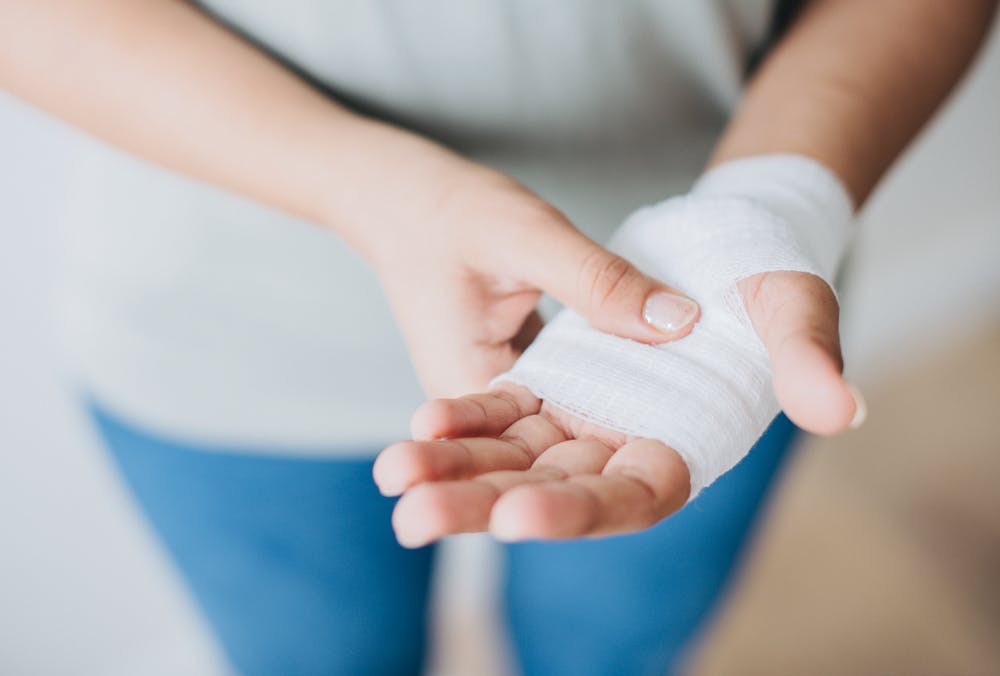nalco group
bone, muscle & joint pain physio
BOOK NOW / WHATSAPP ABOUT YOUR PAIN OR INJURY
- ORCHARD 400 Orchard Road #12-12 Singapore 238875
- TAMPINES 9 Tampines Grande #01-20 Singapore 528735
- SERANGOON 265 Serangoon Central Drive #04-269 Singapore 550265
Home > Blog > Hand Therapy & Customized Splinting > Finger, Hand, Wrist, Forearm & Elbow Conditions > Hand Pain Causes And Hand Therapy
Hand Pain Causes And Hand Therapy

Our hands are very complex and fascinating - they contain bones, ligaments, tendons, nerves, skin, and other structures that allow your body to perform a complex variety of activities...and it is also linked to our personality and psychology too.
We demand a lot of our hands to work, communicate, live, do complex and simple tasks, connect with others; and because of this, if our hands and fingers get injured, it causes a myriad of problems. That is why there are such things as specialist hand surgeons and specialist hand therapists, both of which dedicate their lives to helping patients resolve their hand problems.
It is very hard to summarize all the causes of hand pain in a single article or resource...but there are some conditions that cause the vast majority of symptoms of hand pain. Here we will cover some of these more common causes of hand pain, and some of the signs that you may need further help in solving your problem.
hand pain Causes
Arthritis
The hand is the one of the most common part of the body to be affected by arthritis. It is so common that arthritis is considered a normal part of the aging process. A large majority of people over the age of 60 develop hand arthritis.
Hand arthritis is not abnormal, but
- some people are affected at an
earlier age, and
- some have worse symptoms than others
Fortunately, most patients with hand and finger arthritis can find pain relief with nonsurgical treatments (including recommending hand therapy). Usually with taking some simple steps, patients can control the symptoms of hand arthritis and not require more invasive treatments.
Tendinitis/Trigger Finger
Tendon problems are also common cause of hand pain. Tendonitis refers to a condition where inflammation occurs within or around a tendon (such as tennis elbow, golfer's elbow, de Quervain's). The usually smooth movement of hands and fingers can be affected, causing pain and swelling at the site of the inflammation.
Another common tendon problem happens when the tendons to the fingers develop a nodular swelling, causing the finger to become stuck as it moves back and forth. When the tendon releases, it causes a snapping/locking sensation known as a trigger finger.
Ligament Injury
Ligament injuries of the hands can occur as a result of trauma to the
hand or fingers. The hand has a lot of bones in it (27 bones) that are all connected by an
elaborate complex network of ligaments. These ligaments allow for movement but
work to prevent instability in the joints
Injuries to this network of ligaments can cause problems with simple activities such as even
- difficulty bending
- difficulty gripping
- difficulty pinching
- difficulty lifting
- etc
Ligament injuries of the hand can take months for healing, and it is not uncommon for people to notice swelling and stiffness for a long time after a hand ligament problem (months if not years)
Nerve Irritation
Several major nerves provide sensation and innervation to the hand and fingers, and injury or compression of these nerves will often lead to symptoms of hand pain.
The most common condition is carpal tunnel syndrome, which happens when there is irritation or damage to the median nerve in the wrist. People with carpal tunnel syndrome will often complain of pain and numbness in specific parts of the hand (the thumb, index finger, middle finger and vertical half of the ring finger closer to the thumb).
Other nerves can also be compressed; carpal tunnel syndrome is not the only nerve problem that causes hand pain. Cubital tunnel syndrome occurs when the ulnar nerve is pinched behind the elbow joint.
Fractures
Broken bones (medically termed as fractures) in the hand are direct source of hand pain. With 27 bones in the hand, there are a lot of possibilities and angles of breakage that can happen, depending on injury type and force. Every different location, type and severity will warrant a different type of hand therapy intervention.
Most fractures will heal with simple, nonsurgical treatment, unless they're severe and especially if they're displaced (eg comminuted fracture that has shifted).
Ganglion Cysts
A ganglion cyst can occur anywhere in the body where fluid that is normally contained within a joint or tendon sheath accumulates into a pouch, but they tend to be more common in the hands.
There are 2 reasons for this:
-
First, there
are a lot of joints and tendon sheaths in the hand where a ganglion cyst
can form
- Second, people often notice the ganglions in the hands because they are visibly apparent under the skin
Ganglion cysts are usually painless...but can cause pain in the hand when the cysts interfere with normal movements of the joints and tendons. Of course there are other types of lumps and bumps that can occur on the hands, and if your bump is not a ganglion cyst, you can investigate some of the other causes of lumps and bumps on the hands.
hand pain: When to See a Doctor

Most of the time, simple hand pain will resolve with simple treatments. However, there are some conditions that require more urgent treatment by your doctor.
Concerning signs include:
- Signs of infection including redness, fevers, and chills
- Deformity of the hand or fingers after an injury
- Inability to bend the fingers or make a fist
- Worsening numbness in the fingers or hand
- Pain that does not improve with simple treatments
hand pain Diagnosis
Hand assessments, testing and examination is complex and will take a lot of expert time and practice, as the hands are so complex. A skilled doctor or hand therapist can (and will) isolate specific joints, tendons, and ligaments to evaluate their function. Dozens of specific tests have been described to evaluate for the various different problems that can cause hand pain.
That said, most clinicians will perform a basic evaluation and then select specific tests focused on your individual problem. A typical examination will begin with an assessment of the following characteristics of your hand:
- Appearance
- Tenderness
- Mobility
- Stability
- Strength
Many different imaging tests can be performed to evaluate hand function and the most commonly known ones is the X-ray, which is great to determine bone and joint health, alignment and any deformities. If want more indepth, patients may undergo
- CT scanning
- MRI
- or do lab tests
hand pain Treatment
Most simple hand conditions will respond to a few simple treatments, and not every condition is best treated with each of these modalities, therefore be sure that you understand the cause of your symptoms before embarking on a treatment program.
Rest: Many causes of hand pain are the result of repetitive or overuse syndromes. These conditions typically occur after performing repetitive activities and will often resolve by themselves with rest. By avoiding the activity, symptoms of inflammation can subside and discomfort will often resolve with rest, time, and no further treatment.
Customized Splints: In situations where the pain is more significant and rest does not improve or control symptoms, a simple splint or brace will allow the hand to rest and the inflammation to subside (as well as protect the injury site). People who have recurrent symptoms may wear a brace during an activity to prevent symptoms from flaring up.
Cold Therapy: Ice (cold) is a useful tool to control inflammation and alleviate pain. By applying ice to an area that is painful or contains inflammation, you can reduce swelling while also controlling pain. Not everyone likes the feel of ice on their hands (they are more sensitive), so this may not work for you.
Heat Therapy: Heat application may work well too, but especially moreso for more "chronic" or older pains, and is not suitable for "fresh/acute" conditions. Patients with recurrent hand problems find the heat soothes and "loosens" up their hand. You can do this by running warm water over your hand, or use our electric heat packs.
Anti-inflammatory medications: Oral
anti-inflammatory medications, called NSAIDs, are very useful to relieve
inflammation and pain. Note that these medications can have side-effects, and you
should check with your doctor before starting these medications. We can refer you to orthopedic surgeons for your hand pain and for anti-inflammatories too.
Hand therapy: Hand therapists are therapy experts of the hand. Our senior hand therapist have many therapy different modalities that can be applied to a variety of hand conditions. They can also help prevent recurrence of symptoms down the road.
